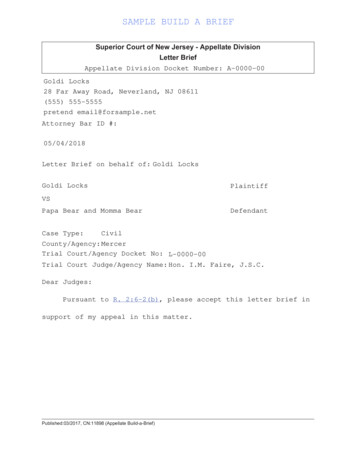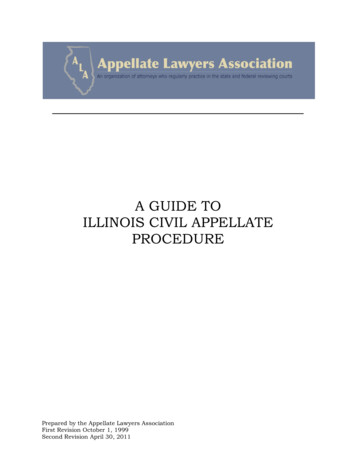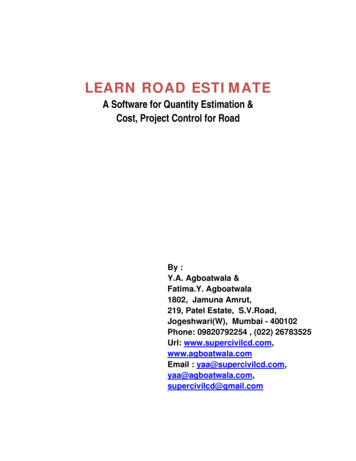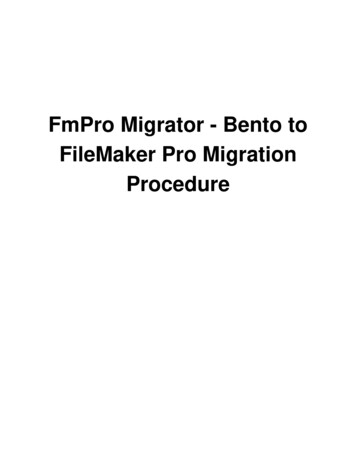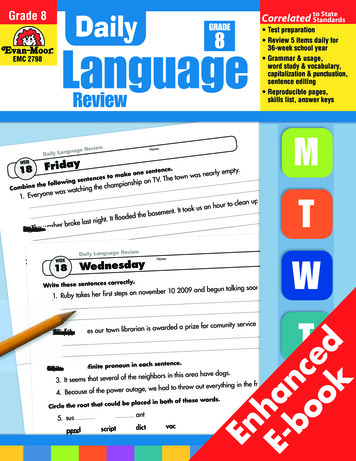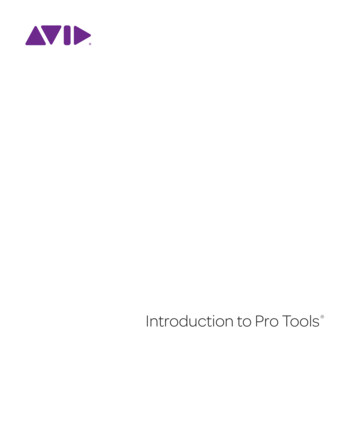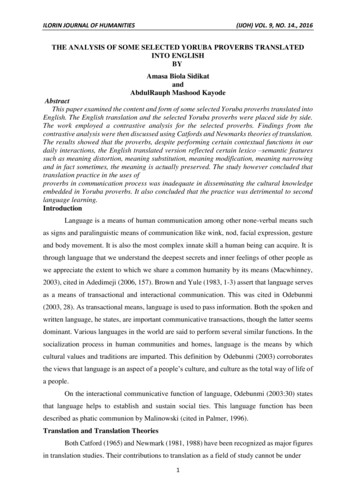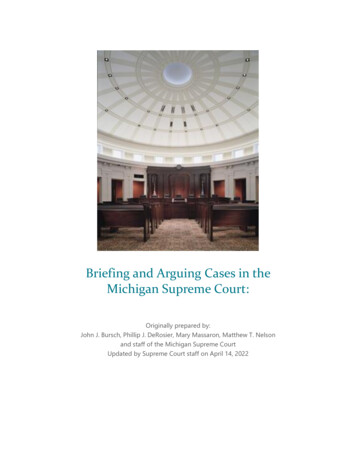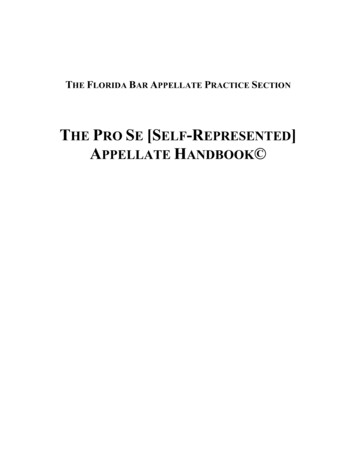
Transcription
THE FLORIDA BAR APPELLATE PRACTICE SECTIONTHE PRO SE [SELF-REPRESENTED]APPELLATE HANDBOOK
FLORIDA BAR APPELLATE PRACTICE SECTION OFFICERSCHRISTOPHER V. CARLYLE, CHAIR 2015-2016DUANE DAIKER, CHAIR-ELECT 2015-2016KRISTIN NORSE, VICE CHAIR 2015-2016SARAH LAHLOU-AMINE, SECRETARY/TREASURER 2015-2016CECI CULPEPPER BERMAN, IMMEDIATE PAST CHAIR 2015-2016JOANNE SHEARER, SECTION LIAISONTHE PRO SE [SELF-REPRESENTED] APPELLATEHANDBOOK COMMITTEEPAST EDITORS-IN-CHIEF(IN ALPHABETICAL ORDER)BRETTON C. ALBRECHT, DOROTHY F. EASLEY, KIMBERLY JONESPAST CO-EDITORS(IN ALPHABETICAL ORDER)BRETTON C. ALBRECHT, CARYN BELLUS, G. RAEMY CHAREST, DOROTHY EASLEY, SUSAN W.FOX, KIMBERLY JONES, SIOBHAN HELENE SHEA, LAURA TRIPLETTORIGINAL COMMITTEE LIAISONSTHOMAS D. HALL, LIAISON TO THE COURTS AND TO THE FLORIDA BARHARVEY J. SEPLER, LIAISON TO THE FLORIDA BAR FOUNDATIONMEMBERS(CHAPTER CONTRIBUTORS AND/OR ASSISTANT EDITORS, IN ALPHABETICAL ORDER)BRETTON C. ALBRECHTCARYN L. BELLUSCECI C. BERMANALLISON BERNSTEINYASIR BILLOOSTEVEN L. BRANNOCKDAVID M. CALDEVILLATRACY CARLING. RAEMY CHARESTBETH COLEMANWENDIE COOPERHONORABLE MARGUERITE DAVIS,(1ST DCA, RETIRED)DOROTHY F. EASLEYANGELA FLOWERSSUSAN W. FOXKEVIN D. FRANZCARLOS GONZALEZBARBARA GREENJEFF GILLENVALERIA HENDRICKSCHRISTOPHER HOPKINSMARIA KAYANANKIMBERLY JONESHONORABLE PATRICIA KELLY,(2D DCA)CALIANNE LANTZBIANCA LISTONWENDY LOQUASTOROBERTA MANDELJOHN MILLSAMANDA NEFFKRISTIN NORSEHONORABLE KATHRYN PECKO(DOAH COMPENSATION CLAIMS,RETIRED)KARLA PERKINSTYLER PITCHFORDGRAY PROCTORSARA PRUGHJACK R. REITERPURY L. SANTIAGOADAM S. TANENBAUMLAURA TRIPLETTCRAIG TROCINOMARIANNE TRUSSELLROBERT STURGESSSARAH T. WEITZLAURA K. WENDELLJENNIFER WINEGARDNERKATHERINE YANES
TABLE OF CONTENTSChapterPage No.Pro Se Appellate Handbook Disclaimer. 1Chapter 1:Introduction . 5Chapter 2:Attorney’s Fees and Costs on Appeal . 13Chapter 3:Pulling Together the Record on Appeal . 16Chapter 4:Motion Practice in the Appellate Courts . 44Chapter 5:Writing an Appellate Brief . 48Chapter 6:Checklist for Appellate Briefs andGenerally Petitions in the District Courts of Appeal . 61Chapter 7:Timeline for Appeals from Final Orders of Lower Tribunals . 66Chapter 8:The Appellate Process Concerning Final Appeals . 70Chapter 9:Appeals From Non-Final Orders:What Can Be Appealed, When and How . 85Chapter 10:Extraordinary Writs--Civil . 97Chapter 11:Stays Pending Review . 108Chapter 12:Pro Se Anders Briefs: What a Criminal DefendantShould Do When His or Her Attorney Files an Anders Brief . 115Chapter 13:Appeals of Motions for Postconviction Relief . 128Chapter 14:Appeals of Orders from Dependency andTermination of Parental Rights Cases . 138Chapter 15:Administrative Appeals . 157Chapter 16:Unemployment Compensation/Reemployment Assistance Appeals . 164Chapter 17:Workers’ Compensation Appeals . 171Chapter 18:Oral Argument in Florida’s AppellateCourts and Florida’s Supreme Court . 179
Chapter 19:Post-Decision Motions--Appellate . 182Chapter 20:Florida Supreme Court Jurisdiction and Seeking Review . 189Chapter 21:Derived from Seeking Review in the U.S. Supreme Court.From the Office of the ClerkSupreme Court of the United StatesWashington, D.C. 20543 . 198Chapter 22:Appeals-Related Court Contact Information. 223Glossary. 236
PRO SE APPELLATE HANDBOOK DISCLAIMERCAUTION: READ THIS DISCLAIMER BEFORE PROCEEDINGTHIS HANDBOOK IS NOT INTENDED TO BE A SUBSTITUTE FORADVICE BY AN EXPERIENCED APPELLATE LAWYER ON HOWTO HANDLE AN APPELLATE MATTERThe PRO SE APPELLATE HANDBOOK: REPRESENTING YOURSELF ON APPEAL 2007, FloridaAppellate Practice Section, is prepared by individual members of The Florida Bar AppellatePractice Section as a public service. This “Pro Se” or “Self-Represented Litigant” Handbook isnot a comprehensive appellate guide, and it does not answer all questions or guarantee success. Itis also not intended to advise individuals in the unlicensed practice of law. It should not be citedto as authority. This Handbook is not to be used to provide legal advice to other people, nor wouldattorneys who are not experienced in appellate practice do well in relying on this Handbook. It isalways a work in progress and is not all-inclusive. The most current version can be found at:http://www.flabarappellate.org.This is a very basic guide to assist someone unable to hire an attorney to advance or defendan appellate matter. It is not a substitute for reading and understanding all of the Florida Rules ofAppellate Procedure, which apply to all types of appeals and extraordinary writs. Nor is it asubstitute for retaining an appellate attorney skilled in the law and knowledgeable in appellatepractice.A PARTY TO AN APPELLATE CASE SHOULD HIRE AN ATTORNEYEDUCATED AND EXPERIENCED IN APPELLATE PRACTICE.A pro se party must read and understand the Florida Rules of Appellate Procedure and anyother Florida rules and statutes that may apply. A pro se party may also do well to consult FloridaAppellate Practice, published by The Florida Bar, and Florida Appellate Practice, by Philip1Current through June 2016Copyright: The contents of this Pro Se Appellate Handbook 2007, Florida Appellate Practice Section, are not available for saleor commercial exploitation. Electronic copies may be obtained at www.flabarappellate.org
Padovano, as well as other Florida appellate manuals for additional information on appeals andpetitions.CAUTION: THE DANGERS OF SELF-REPRESENTATION“Self-Representation” or proceeding “pro se” means the party does not have a lawyer in alegal matter and is representing himself or herself, regardless of whether the self-representation isby choice or because the party cannot hire a lawyer. A pro se party should be aware of thefollowing:1.The appellate court is not going to give a pro se party (a partyrepresenting himself or herself) any special treatment or relax the rules simplybecause that party is pro se and is not a lawyer.2.All parties and attorneys must follow the Rules of JudicialAdministration and the Florida Rules of Appellate Procedure, as well as the specificappellate court's internal or “local” rules and procedures. A pro se party who hasno formal legal training is just as responsible as an attorney for following all of therules.3.The Florida Rules of Appellate Procedure set forth the pleadings anddocuments that must be filed in an appeal, along with the deadlines (number ofdays) in which to file the pleadings or documents, such as the notice of appeal andthe appellate briefs.4.All parties must comply with filing deadlines. No party is allowedto file an appeal or brief late simply because that party is representing himself orherself and does not have any formal legal training. No party is allowed to ask for2Current through June 2016Copyright: The contents of this Pro Se Appellate Handbook 2007, Florida Appellate Practice Section, are not available for saleor commercial exploitation. Electronic copies may be obtained at www.flabarappellate.org
extensions of time and/or continuances of a court proceeding simply because thatparty is pro se.5.The appellate court's review of a case is limited to the record onappeal made in the lower tribunal. For example, if a pleading, motion or otherdocument was not filed in the lower tribunal before the appeal, or if a piece ofevidence or an exhibit was not introduced into evidence in the lower tribunal, itcannot be argued or considered for the first time on appeal. This is because thedocument or evidence was not part of the record in the lower tribunal. The recordon appeal is limited to the record that was made in the lower tribunal. Similarly,the appellate court usually cannot consider any argument that was not made in thelower tribunal.6.The appellate court must follow the laws, rules, regulations, andcourt decisions that are controlling and factually on point. The appellate courtcannot make any special exceptions for pro se parties.7.If a lawyer represents the opposing party, the appellate court mayorder the pro se party to pay the opposing party's attorney's fees and costs if thatparty wins the appeal. In certain special cases, such as family law appeals,attorney’s fees may be awarded based on financial need without regard to whoprevails.8.If a lawyer represents the opposing party, a pro se party may have ahard time winning their case. A lawyer's legal training and knowledge may resultin the opposing party winning the case through skillful use of procedural ortechnical requirements, or through skillful use of case law and legal argument.3Current through June 2016Copyright: The contents of this Pro Se Appellate Handbook 2007, Florida Appellate Practice Section, are not available for saleor commercial exploitation. Electronic copies may be obtained at www.flabarappellate.org
9.The Rules Regulating The Florida Bar and the Florida SupremeCourt forbid the “unlicensed practice of law.” That means a non-lawyer (or even alawyer from another state or law student) cannot give legal advice or speak onbehalf of anyone in court proceedings without a license to practice law in the Stateof Florida. In other words, a non-lawyer without a license to practice law in theState of Florida cannot give legal advice to anyone or attempt to act as anotherperson’s lawyer, whether in written papers or in court appearances or otherwise.Both The Florida Bar and the Florida Supreme Court take the unlicensed practiceof law very seriously. The Florida Bar investigates and prosecutes, and the FloridaSupreme Court punishes (including a fine up to 2,500 or jail time up to five (5)months), any person found to have acted as a lawyer on behalf of another personwithout having a license to practice law in the State of Florida.Before proceeding, a pro se party should contact their local bar association and/or TheFlorida Bar and ask whether they have or know of any "pro bono" programs that may help a prose party obtain legal representation in an appeal without having to pay an appellate attorney. Ifthere is no “pro bono” program in place in the area, hiring an appellate attorney may save theotherwise pro se party money in the long run.By using The Florida Bar Appellate Practice Section Pro Se Appellate Handbook, theuser agrees to indemnify and hold harmless The Florida Bar Appellate Practice Section andanyone involved in the preparation of the Pro Se Appellate Handbook.4Current through June 2016Copyright: The contents of this Pro Se Appellate Handbook 2007, Florida Appellate Practice Section, are not available for saleor commercial exploitation. Electronic copies may be obtained at www.flabarappellate.org
CHAPTER 1: INTRODUCTIONA.The Importance of Meeting with an Appellate AttorneyA person who wants to appeal (the "appellant") or who must defend an appeal (the"appellee") is best protected by meeting with an attorney who knows and works in appellate law(an "appellate attorney"). If an appellate attorney is not available, this Handbook should beconsulted immediately upon entry of an order that may be the subject of an appeal.B.The Final Judgment Rule and Why it is ImportantA “final” judgment or order is a written order entered by a trial court (or “lower tribunal”)which ends the case and leaves nothing left to be done except to follow what the final judgment ororder requires the parties to do. In contrast, a “non-final” order does not end the case and usuallycannot be appealed right away. For example, if the trial court rules against a party on an issue ormotion before trial or at trial, the party normally has to wait, and often cannot appeal, until the trialis over and the court has entered a final judgment. After that, the party normally has a right tobring an appeal to challenge the final judgment, and, in the appeal from the final judgment, theparty usually can also challenge any ruling or non-final order entered before the final judgment.So, with some exceptions, appeals generally can only be brought from a final judgment. This iscalled the "final judgment rule." Final judgments are discussed here, as well as in Chapter 8 onthe Appellate Process Concerning Final Appeals. Some of the exceptions to the final judgmentrule are covered in other Chapters of this Handbook, such as Chapter 9 on Appeals from Non-FinalOrders, and Chapter 10, Extraordinary Writs.The final judgment rule is very important to an appellant because an appeal has deadlinesand time limits that must be followed. For example, there is a time limit for filing an appeal, anda party who fails to file an appeal within that time limit may lose or “waive” the right to appeal.5Current through June 2016Copyright: The contents of this Pro Se Appellate Handbook 2007, Florida Appellate Practice Section, are not available for saleor commercial exploitation. Electronic copies may be obtained at www.flabarappellate.org
Thus, one of the important reasons to consult or retain an appellate attorney, if one is available,is to find out whether a specific order can be appealed, and, if so, whether the appeal has to befiled right away.C.The General Procedures for an AppealAn appeal is begun by filing a “notice of appeal” within the deadline required bythe Florida Rules of Appellate Procedure. If this time limit is not followed, a person maynot be able to appeal. The failure to timely file a notice of appeal is called "waiving” the rightto an appeal. In Florida, the time limit for filing a notice of appeal from a final order or judgmentgenerally starts to run when the lower tribunal enters or "renders" the final judgment or order("rendition"). The appellant usually has 30 days from the date of “rendition” to file a notice ofappeal. See Florida Rule of Appellate Procedure 9.110(a)&(b) (civil and final administrative lawcases); Florida Rule of Appellate Procedure 9.140(b)(3) (criminal cases); see also Florida Rule ofAppellate Procedure 9.020 (definitions); Florida Rule of Appellate Procedure 9.030 (jurisdictionof the courts).The time limit for filing a notice of appeal is a “jurisdictional” deadline. This means that ifthe notice of appeal is not filed within the time limit, the appellate court usually will not havethe power, or “jurisdiction,” to hear the appeal, and the appeal will be dismissed. The rest of thedeadlines, such as the time limits for filing the briefs, are also important and should be followed,but many are not “jurisdictional.” This means the appellate court still has the power to hear theappeal, but it may decide to dismiss for a party’s failure to follow the rules and procedures for theappeal.After filing a notice of appeal, the appellant then has 10 days to file what are called"directions to the clerk" and "designations to the court reporter." See Florida Rule of Appellate6Current through June 2016Copyright: The contents of this Pro Se Appellate Handbook 2007, Florida Appellate Practice Section, are not available for saleor commercial exploitation. Electronic copies may be obtained at www.flabarappellate.org
Procedure 9.200(a)-(b). The directions to the clerk are directions telling the lower tribunal clerkwhat the appellant wants to have included in the record on appeal. Putting together the record onappeal is discussed in detail in Chapter 3 of this Handbook.The party opposing the appeal, the "appellee," generally has 10 days from the filing of thenotice of appeal to file a "cross-appeal." A cross-appeal is filed if the appellee believes the lowertribunal made a mistake in not granting all of the relief the appellee wanted. See Florida Ruleof Appellate Procedure 9.110(g) (civil and final administrative law cases); Florida Rule ofAppellate Procedure 9.140(b)(4) (criminal cases). If a cross-appeal is filed, the parties are called,"appellant/cross-appellee" and "appellee/cross-appellant."It is important to understand the difference between a notice of appeal and a notice of crossappeal. A notice of cross-appeal is only filed in cases where the appellee believes the lower tribunalmade a mistake in not granting all of the relief the appellee wanted in the specific final judgmentor final order being appealed. But, if the appellee believes there is another, separate final order orfinal judgment in the same case that was erroneous or did not grant all of the desired relief, thenthe appellee must file his or her own notice of appeal from that order, not a notice of cross-appeal.And, again, any notice of appeal must be filed within 30 days of the date of that final judgment ororder.Once the notice of appeal is filed, the lower tribunal clerk prepares the record on appealand sends it to the appellate court. Fifty days after the notice of appeal is filed, the lower tribunalsends the appellate parties (the appellant and the appellee) an "index” to the record on appeal. Theindex to the record on appeal is a list of everything in the lower tribunal/court file, with pagenumbers, that the clerk of the lower tribunal will be sending to the appellate court. The recordon appeal, which is discussed in more detail in Chapter 3, is made up of the documents—such as7Current through June 2016Copyright: The contents of this Pro Se Appellate Handbook 2007, Florida Appellate Practice Section, are not available for saleor commercial exploitation. Electronic copies may be obtained at www.flabarappellate.org
the pleadings, pre-trial motions, orders, discovery, and evidence (“exhibits”)—that were filed andmade part of the “record” in the lower tribunal. It usually also has transcripts of the hearings thatthe lower tribunal judge held and transcripts of any trial, if the hearing or trial was “transcribed”(typed-out by a court reporter), and if one of the parties filed those transcripts with the lowertribunal. See Florida Rule of Appellate Procedure 9.200.There are also time limits for filing appellate briefs. Appellate briefs are the writtenarguments of the appellant and the appellee that are presented to the appellate court. The argumentsin an appellate brief must be limited to the matters contained in the appellate record. Theappellant's initial brief is generally due 70 days after filing the notice of appeal. See Florida Ruleof Appellate Procedure 9.110(f). The appellee’s answer brief is then due 20 days after the initialbrief, and the appellant’s reply brief is due 20 days after the answer brief. See Florida Rule ofAppellate Procedure 9.210(f). If the appellant needs more time to file a brief, the appellantusually may file a motion for an extension of time with the appellate court (usually for 30 or 60days), so long as the motion for extension is filed before the deadline for the brief. Before filinga motion for an extension, the appellant is generally required to contact the opposing party to askif the opposing party will agree or object to the motion for an extension. The motion for extensionshould, in addition to requesting the extension, also state whether the opposing party objects oragrees to the extension. The same general procedure for seeking extensions would also apply tothe answer brief and the reply brief.The appellate briefs are filed with the appellate court before oral argument. Oral argumentis like a formal hearing before a trial judge. The main differences are that appellate oral argumentsare usually heard by a “panel” of three judges and arguments are limited to those contained in theappellate briefs and supported by the appellate record—no new evidence or arguments can be8Current through June 2016Copyright: The contents of this Pro Se Appellate Handbook 2007, Florida Appellate Practice Section, are not available for saleor commercial exploitation. Electronic copies may be obtained at www.flabarappellate.org
made. The party seeking to present oral argument must file a "request for oral argument" in aseparate document, generally not later than 10 days after the reply brief is due. See Florida Ruleof Appellate Procedure 9.320. After the parties have filed their briefs, and if a request for oralargument was made, the appellate court will decide whether to grant oral argument. Appellatecourts do not always grant a request for oral argument. If oral argument is not granted, the casewill be decided based on the arguments in the appellate briefs, without holding an oralargument. If the appellate court grants a request for oral argument, the appellate court will sendan order or notice of oral argument, which will state the date and time of the oral argument andhow many minutes each side will have to argue their case.It is important to remember that appellate courts do not take new evidence orconsider new arguments. An appeal is based on what happened in the lower tribunal.Appellate courts decide whether the trial judge made mistakes or “errors” below, such as inadmitting or excluding evidence. Appellate courts also generally do not consider arguments thatwere not made to the lower tribunal. If an argument or objection was not made to the lowertribunal (at a time when the lower tribunal could “fix” the reason for the objection), the appellatecourt usually will not consider the argument for the first time on appeal, unless the error was“fundamental,” meaning it usually must have destroyed the fairness of the whole case.Litigants should also understand that there have been many changes in the appellate courtsand rules over the years in Florida. These changes include limiting the number of pages allowedin appellate briefs to 50 pages for the appellant's initial brief, 50 pages for the appellee's answerbrief, and 15 pages for the appellant's reply brief. See Florida Rule of Appellate Procedure 9.210.The appellate courts generally will not allow briefs that go over these page limits. Requests for anincrease in the page limits can be made, but they are rarely granted. The time allowed to present9Current through June 2016Copyright: The contents of this Pro Se Appellate Handbook 2007, Florida Appellate Practice Section, are not available for saleor commercial exploitation. Electronic copies may be obtained at www.flabarappellate.org
any oral argument is very limited. Most appellate courts allow only a set number of minutes fororal arguments, usually 10 or 20 minutes per side. At oral argument, the parties must make theirargument within the time allowed by the court.An appellate court’s consideration of the issues and arguments raised in an appeal will beframed by what is called "the standard of review." The standard of review determines howmuch weight or deference the appellate court will give to, or how strictly it will question,the lower tribunal's rulings. The greater the deference, the harder it will be to convince theappellate court to find the lower tribunal's decision was a mistake. Appellate courts give greatdeference to a lower tribunal's findings of fact. This is because the trial judge or jury, andnot the appellate court, had the best opportunity to observe the witnesses and determine, firsthand, how truthful the witnesses appeared to be. Appellate courts will normally not find thelower tribunal's findings of fact to be a mistake unless the appellate courts decide the findings offact are not supported by "competent, substantial evidence" or are "clearly erroneous."Appellate courts also give a lot of deference to issues below that involve both law and facts,such as rulings about what evidence will or will not be allowed during trial. As to those kinds ofmatters, a lower tribunal has discretion, and appellate courts generally will not find such rulings tobe mistaken unless an "abuse of discretion" is shown, meaning no reasonable judge would havemade the same decision under the law and facts.Finally, appellate courts review pure legal issues with the least amount of deference tothe lower tribunal. This is called the "de novo" standard of review. Under this standard,appellate courts decide for themselves what the law says and what the decision of law should be.The reason so little deference is given when reviewing a pure legal issue is because appellatecourts are in just as good a position to decide the law as lower tribunals.10Current through June 2016Copyright: The contents of this Pro Se Appellate Handbook 2007, Florida Appellate Practice Section, are not available for saleor commercial exploitation. Electronic copies may be obtained at www.flabarappellate.org
D.ConclusionGiven the complex requirements and procedures for an appeal, it is important for anappellant to carefully consider whether to go ahead with an appeal without the help of anappellate lawyer. By hiring an experienced, qualified appellate lawyer who understands the lawand rules of procedure, a party may increase their odds of winning and may save money in thelong run. If the appellant cannot locate an experienced appellate lawyer, then the appellant shouldread this Handbook cover to cover, as well as other appellate books, as soon as the appellant getsan order that the appellant wants to appeal. In that way, the appellant has important informationto decide whether the appellant can even appeal, whether the appellant must appeal right away, and,if so, the time by which the appellant must act and the procedures for doing so.Finally, it must be remembered that the law and rules of procedure change frequently. Aself-represented or “pro se” litigant is responsible for following the current laws and rules ofprocedure. Thus, a pro se litigant should review the most current laws and rules in addition to thisHandbook, as some laws or rules may have changed. As just one example, the rules in the area ofserving (sending) documents to other parties by e-mail and filing documents electronically withthe court are still developing and changing, especially as to pro se litigants. Currently, service bye-mail is available for pro se parties if certain procedures and requirements are followed. SeeFlorida Rules of Judicial Administration 2.514(b) and 2.516(b). In addition, most courts nowallow (but do not require) electronic filing by pro se parties. See Florida Rule of JudicialAdministration 2.525(c)-(d). The requirements for electronic filing, even when it is available,often vary in different courts. Accordingly, pro se parties interested in electronic filing shouldconsult the website or clerk’s office of the particular court to find out if electronic filing is allowed,11Current through June 2016Copyright: The contents of this Pro Se Appellate Handbook 2007, Florida Appellate Practice Section, are not available for saleor commercial exploitation. Electronic copies may be obtained at www.flabarappellate.org
and, if so, the requirements for electronic filing and service by e-mail. See also Florida Rules ofJudicial Administration 2.516 and 2.525(c)-(d).Unless e-mail service or electronic filing is allowed, service or filing of a document mustgenerally be done by mail or personal delivery (to the other party for service, and to the court forfiling). So, in addition to consulting the most up-to-date version of the rules of procedure(available on The Florida Bar’s website at http://www.floridabar.org/tfb/TFBLegalRes.nsf/) andother laws, a pro se litigant should also consult the website or clerk’s office of the specific courtto find out if electronic filing with the court and/or service of documents to other parties by e-mailmay be allowed, and to find out if the court may have additional requirements specific to that court.12Current through June 2016Copyright: The contents of this Pro Se Appellate Handbook 2007, Florida Appellate Practice Section, are not available for saleor commercial exploitation. Electronic copies may be obtained at www.flabarappellate.org
CHAPTER 2: ATTORNEY’S FEES AND COSTS ON APPEALA.Is a Pro Se Litigant Entitled to Attorney’s Fees on Appeal?The short answer is no. A pro se litigant, meaning a party who is not an attorney and whois representing himself or herself, is not entitled to attorney’s fees for his or her own time spentappealing a case. In contrast, a party represented by an attorney may be able to seek attorney’sfees on appeal if there is a basis for awarding such fees. This means a pro se litigant may beresponsible for the opposing party’s appellate attorney’s fees.B.Can a Pro Se Litigant Be Responsible for the Opposing Party’s Attorney’s Fees?Yes. A pro se litigant may be responsible or “liable” on appeal for the opposing party’sattorney’s fees, if the opposing party is represented by an attorney (or is an attorney). For theoppos
florida bar appellate practice section officers christopher v. carlyle, chair 2015-2016 duane daiker, chair-elect 2015-2016 kristin norse, vice chair 2015-2016 sarah lahlou-amine, secretary/treasurer 2015-2016 ceci culpepper berman, immediate past chair 2015-2016 joanne shearer, section liaison the pro se [self-represented] appellate handbook committee

